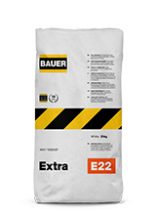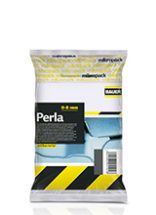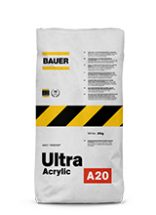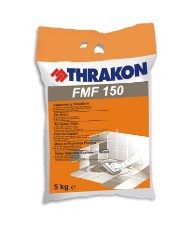-
BAUER Extra High standard cementitious base tile adhesive €4.00 – €9.00
High-standard cement-based tile adhesive.
For welding ceramic tiles on walls and floors.
Ideal for concrete surfaces, cement mortar, brickwork, plasters, etc.
With resistance to frost and moisture.
It offers increased thixotropy during application and low sliding when tiles are placed on vertical surfaces.
For indoors and outdoors.
It is classified as an enhanced glue of type C2T in accordance with the European Directive EN 12004.Available in : 5kg, 25kg WHITE
High-standard cement-based tile adhesive.
For welding ceramic tiles on walls and floors.
Ideal for concrete surfaces, cement mortar, brickwork, plasters, etc.
With resistance to frost and moisture.
It offers increased thixotropy during application and low sliding when tiles are placed on vertical surfaces.
For indoors and outdoors.
It is classified as an enhanced glue of type C2T in accordance with the European Directive EN 12004.Available in : 5kg, 25kg WHITE
Quick ViewOut of stock
-
BAUER Perla 0-8mm Reinforced, cement-shaped base, water repellent and high strength, tile grout €8.00
Reinforced, cement-shaped base, water repellent and high strength, grout of tiles.
It offers unique color stability, unsurpassed resistance to stresses, with bacteriostatic properties that do not allow the creation of bacteria. Highly resistant to dirt and easy to clean.
Suitable for grouting ceramic tiles, ceramic granites, glazing and natural stones on any substrate, for indoor or outdoor use on walls or floors. Its rheological properties and advanced composition offer quick filling of joints and very easy cleaning of residues.
It is classified as reinforced grout, waterproof and highly resistant to abrasion type CG2 WA according to the European directive EN 13888.
Form: dry mortar in 16 colors
Density of mixture with water: ≈2,0 kg/lAvailable in : 5kg
Reinforced, cement-shaped base, water repellent and high strength, grout of tiles.
It offers unique color stability, unsurpassed resistance to stresses, with bacteriostatic properties that do not allow the creation of bacteria. Highly resistant to dirt and easy to clean.
Suitable for grouting ceramic tiles, ceramic granites, glazing and natural stones on any substrate, for indoor or outdoor use on walls or floors. Its rheological properties and advanced composition offer quick filling of joints and very easy cleaning of residues.
It is classified as reinforced grout, waterproof and highly resistant to abrasion type CG2 WA according to the European directive EN 13888.
Form: dry mortar in 16 colors
Density of mixture with water: ≈2,0 kg/lAvailable in : 5kg
Quick ViewOut of stock
-
BAUER Ultra acrylic High quality resinous cement-based tile adhesive €12.00
High standard resinous glue of cement-based tiles.
For bonding tiles of all types, natural stones and tiles of large dimensions on walls and floors.
Ideal for concrete surfaces, cement mortar, brickwork, plasters, etc.
Excellent resistance to frost and moisture.
It offers increased thixotropy during application and low sliding when tiles are placed on vertical surfaces.
It offers great open application time for greater speed and safety in installation.
It is classified as an enhanced glue type C2TE according to the European Directive EN 12004.Available in : 25kg WHITE
High standard resinous glue of cement-based tiles.
For bonding tiles of all types, natural stones and tiles of large dimensions on walls and floors.
Ideal for concrete surfaces, cement mortar, brickwork, plasters, etc.
Excellent resistance to frost and moisture.
It offers increased thixotropy during application and low sliding when tiles are placed on vertical surfaces.
It offers great open application time for greater speed and safety in installation.
It is classified as an enhanced glue type C2TE according to the European Directive EN 12004.Available in : 25kg WHITE
Quick ViewOut of stock
-
THRAKON FMF 150 Colored Grout €5.50
Colored grout of 1 component, cementitious base, suitable for grouting tiles
Hue: See Color Chart FMF 150
Packaging: Plastic poke 5kg
Consumption: See Technical Brochure (TDS)
Description
Modified with polymeric additives, it consists of cement, quartz sand, calcareous fillers and improvers. Fmf 150 has high mechanical strength and resistance to frost and humidity. It is classified as competent type CG2 based on EN 13888 for internal and external use. It is produced in two types:
Fine-grained for joint thickness up to 5mm
Chondrococcus for joint thickness 5-20mm
Fields of Application
- Suitable for grouting absorbent and non-absorbent tiles (e.g. granites) on all common substrates, on horizontal or vertical surfaces, in dry and wet areas
- Suitable for indoor and outdoor use
Advantages
- Produced with quartz sand
- Strong adhesion to demanding substrates
- Abrasion resistance
- Excellent workability
- Quick implementation
- Resistance to moisture and frost
- Produced and controlled according to the European standard EN 13888
Implementation Steps
Step 1
The substrate of the paving should be flat, clean of loose and foreign bodies such as plaster residues, paints, oils, etc., without cracks, stable and free from shrinkage and deformation tendencies. In addition, it should not be subjected to vibrations. Suitable substrates are concrete, self-leveling floors, cement mortar light concrete, bricks, poropeton, cement blocks and cement – lime plasters.
Step 2
In a clean container add 1.05 – 1.10 liters of pure water for fine grain (Νο 301-326) and 1.50 – 1.55 liters of pure water for the coarse grain (No 501-525)
Step 3
Gradually empty the contents of a 5 Kg bag of FMF 150 product, stirring continuously with an electric stirrer to obtain a homogeneous mass of mortar
Step 4
Let the resulting mixture ripen for 5 minutes and stir it a little again
Step 5
The mixture is ready for use for the next 1 hour. After the preparation of the mixture, it is forbidden to add additional water to correct the workability of the mortar. This would lead to a decrease in its strength and an increase in its shrinkage.
Step 6
Apply FMF 150 on the surface and with the special elastic spatula helping it to penetrate the joints, with diagonal and crossed movements
Step 7
Clean the excess grout from the joints with a wet sponge
Step 8
When the grout pulls enough, rub the entire surface with a sponge and form the surface of the joint
Step 9
After the grout has tightened, rub and smooth the surface of the joints with a damp cloth, giving their final appearance
Step 10
This is followed by mopping of the surface of the tiles and removal of the remnants of materials and pollutants. The use of detergents and other caustic cleaning should be applied after the complete drying of the grout. During the application and during the next 24 hours the temperature of the environment and the substrate should be between +5C and +35C
Step 11
The grout when it is still fresh is cleaned with water. When hardened it is mechanically removed
Storage
It is kept stored in wooden pallets and in a dry environment with a temperature greater than 0°C for 12 months from the date of production
Colored grout of 1 component, cementitious base, suitable for grouting tiles
Hue: See Color Chart FMF 150
Packaging: Plastic poke 5kg
Consumption: See Technical Brochure (TDS)
Description
Modified with polymeric additives, it consists of cement, quartz sand, calcareous fillers and improvers. Fmf 150 has high mechanical strength and resistance to frost and humidity. It is classified as competent type CG2 based on EN 13888 for internal and external use. It is produced in two types:
Fine-grained for joint thickness up to 5mm
Chondrococcus for joint thickness 5-20mm
Fields of Application
- Suitable for grouting absorbent and non-absorbent tiles (e.g. granites) on all common substrates, on horizontal or vertical surfaces, in dry and wet areas
- Suitable for indoor and outdoor use
Advantages
- Produced with quartz sand
- Strong adhesion to demanding substrates
- Abrasion resistance
- Excellent workability
- Quick implementation
- Resistance to moisture and frost
- Produced and controlled according to the European standard EN 13888
Implementation Steps
Step 1
The substrate of the paving should be flat, clean of loose and foreign bodies such as plaster residues, paints, oils, etc., without cracks, stable and free from shrinkage and deformation tendencies. In addition, it should not be subjected to vibrations. Suitable substrates are concrete, self-leveling floors, cement mortar light concrete, bricks, poropeton, cement blocks and cement – lime plasters.
Step 2
In a clean container add 1.05 – 1.10 liters of pure water for fine grain (Νο 301-326) and 1.50 – 1.55 liters of pure water for the coarse grain (No 501-525)
Step 3
Gradually empty the contents of a 5 Kg bag of FMF 150 product, stirring continuously with an electric stirrer to obtain a homogeneous mass of mortar
Step 4
Let the resulting mixture ripen for 5 minutes and stir it a little again
Step 5
The mixture is ready for use for the next 1 hour. After the preparation of the mixture, it is forbidden to add additional water to correct the workability of the mortar. This would lead to a decrease in its strength and an increase in its shrinkage.
Step 6
Apply FMF 150 on the surface and with the special elastic spatula helping it to penetrate the joints, with diagonal and crossed movements
Step 7
Clean the excess grout from the joints with a wet sponge
Step 8
When the grout pulls enough, rub the entire surface with a sponge and form the surface of the joint
Step 9
After the grout has tightened, rub and smooth the surface of the joints with a damp cloth, giving their final appearance
Step 10
This is followed by mopping of the surface of the tiles and removal of the remnants of materials and pollutants. The use of detergents and other caustic cleaning should be applied after the complete drying of the grout. During the application and during the next 24 hours the temperature of the environment and the substrate should be between +5C and +35C
Step 11
The grout when it is still fresh is cleaned with water. When hardened it is mechanically removed
Storage
It is kept stored in wooden pallets and in a dry environment with a temperature greater than 0°C for 12 months from the date of production
Quick ViewOut of stock




